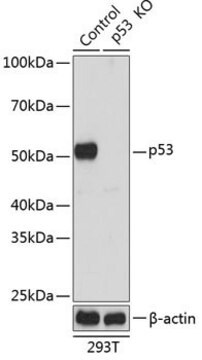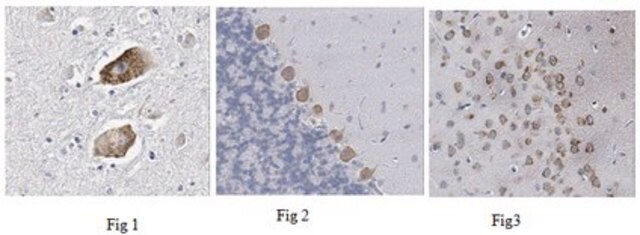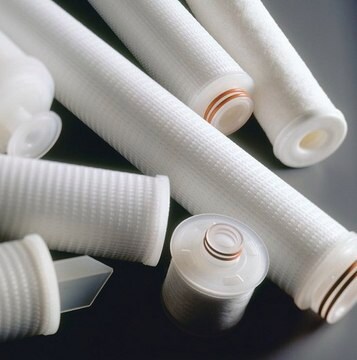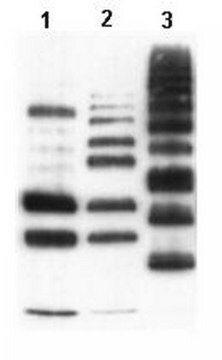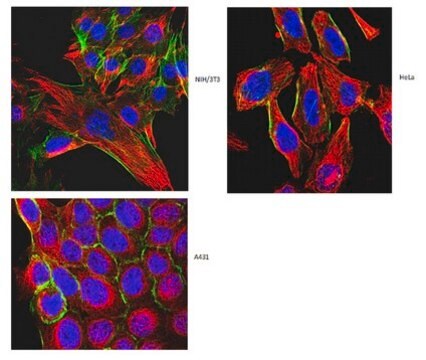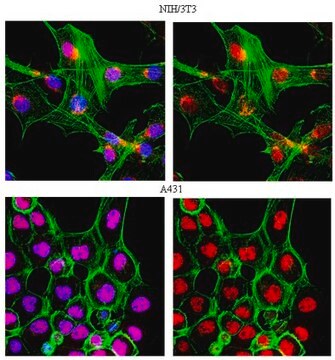おすすめの製品
由来生物
mouse
品質水準
100
200
抗体製品の状態
purified immunoglobulin
抗体製品タイプ
primary antibodies
クローン
3B12.1, monoclonal
交差性
rat, human
テクニック
immunohistochemistry: suitable
western blot: suitable
アイソタイプ
IgG1κ
NCBIアクセッション番号
UniProtアクセッション番号
輸送温度
wet ice
ターゲットの翻訳後修飾
unmodified
遺伝子情報
human ... GJB2(2706)
詳細
Connexin-2 is also known as Connexin Gap junction beta-2 protein (GJB2) and Connexin-26 (Cx26). The connexins are transmembrane channels that diffuse low MW materials from one cell to a neighboring cell. Aberrant connexin-2 can cause deafness autosomal recessive type 1A (DFNB1A), deafness autosomal dominant type 3A (DFNA3A), Vohwinkel syndrome (VS), palmoplantar keratoderma with deafness (PPKDFN), keratitis-ichthyosis-deafness syndrome (KID syndrome), Bart-Pumphrey syndrome (BPS), and ichthyosis hystrix-like with deafness syndrome (HID syndrome).
特異性
Other homologies: Mouse (92% sequence homology).
免疫原
KLH-conjugated linear peptide corresponding to human Connexin-26.
アプリケーション
Research Category
細胞骨格
細胞骨格
Research Sub Category
接着分子(CAM)
接着分子(CAM)
Anti-Connexin-26 Antibody, clone 3B12.1 is a highly specific mouse monoclonal antibody, that targets CX26 & has been tested in western blotting & IHC.
Immunohistochemistry Analysis: A 1:4,000-8,000 dilution from a representative lot detected Connexin-26 in human colon and human liver tissue.
品質
Evaluated by Western Blotting in rat liver tissue lysate.
Western Blotting Analysis: 1.0 µg/mL of this antibody detected Connexin-26 in 10 µg of rat liver tissue lysate.
Western Blotting Analysis: 1.0 µg/mL of this antibody detected Connexin-26 in 10 µg of rat liver tissue lysate.
ターゲットの説明
~26 kDa observed
物理的形状
Protein G Purified
Format: Purified
Purified mouse monoclonal IgG1κ in buffer containing 0.1 M Tris-Glycine (pH 7.4), 150 mM NaCl with 0.05% sodium azide.
保管および安定性
Stable for 1 year at 2-8°C from date of receipt.
アナリシスノート
Control
Rat liver tissue lysate
Rat liver tissue lysate
その他情報
Concentration: Please refer to the Certificate of Analysis for the lot-specific concentration.
免責事項
Unless otherwise stated in our catalog or other company documentation accompanying the product(s), our products are intended for research use only and are not to be used for any other purpose, which includes but is not limited to, unauthorized commercial uses, in vitro diagnostic uses, ex vivo or in vivo therapeutic uses or any type of consumption or application to humans or animals.
適切な製品が見つかりませんか。
製品選択ツール.をお試しください
保管分類コード
12 - Non Combustible Liquids
WGK
WGK 1
引火点(°F)
Not applicable
引火点(℃)
Not applicable
適用法令
試験研究用途を考慮した関連法令を主に挙げております。化学物質以外については、一部の情報のみ提供しています。 製品を安全かつ合法的に使用することは、使用者の義務です。最新情報により修正される場合があります。WEBの反映には時間を要することがあるため、適宜SDSをご参照ください。
Jan Code
MABT198:
MABT198-1MG:
試験成績書(COA)
製品のロット番号・バッチ番号を入力して、試験成績書(COA) を検索できます。ロット番号・バッチ番号は、製品ラベルに「Lot」または「Batch」に続いて記載されています。
Ming Yang Lee et al.
The Journal of investigative dermatology, 140(5), 1035-1044 (2019-11-11)
Keratitis-ichthyosis-deafness (KID) syndrome is a severe, untreatable condition characterized by ocular, auditory, and cutaneous abnormalities, with major complications of infection and skin cancer. Most cases of KID syndrome (86%) are caused by a heterozygous missense mutation (c.148G>A, p.D50N) in the
Nadine Dilger et al.
Frontiers in cell and developmental biology, 8, 869-869 (2020-09-29)
In vitro transdifferentiation of patient-derived mesenchymal stem/stromal cells (MSCs) into neurons is of special interest for treatment of neurodegenerative diseases. Although there are encouraging studies, little is known about physiological modulations during this transdifferentiation process. Here, we focus on the
ライフサイエンス、有機合成、材料科学、クロマトグラフィー、分析など、あらゆる分野の研究に経験のあるメンバーがおります。.
製品に関するお問い合わせはこちら(テクニカルサービス)